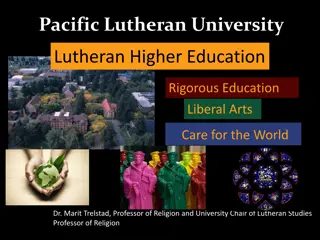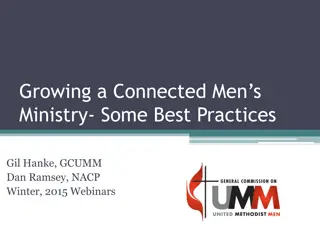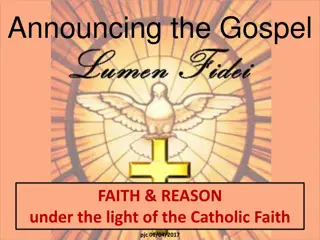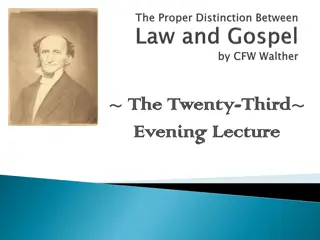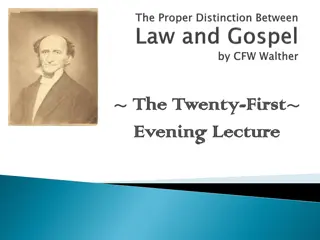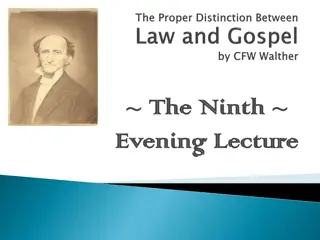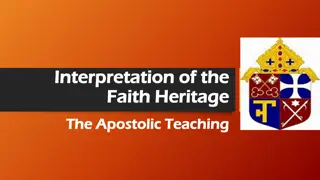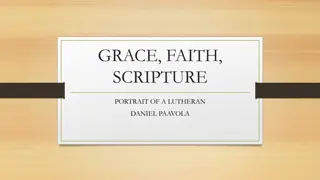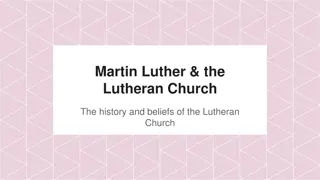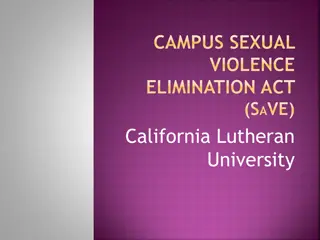Insights on Lutheran Ministry and Faith
Explore profound wisdom on the responsibilities of a Lutheran minister and the importance of genuine faith from the teachings shared in the images. Delve into the significance of righteously dividing the Word of God and understanding the relationship between faith, love, and good works in the Lutheran context.
Download Presentation

Please find below an Image/Link to download the presentation.
The content on the website is provided AS IS for your information and personal use only. It may not be sold, licensed, or shared on other websites without obtaining consent from the author. Download presentation by click this link. If you encounter any issues during the download, it is possible that the publisher has removed the file from their server.
E N D
Presentation Transcript
~ The Twentieth ~ ~ The Twentieth ~ Evening Lecture Evening Lecture
We all remember certain dates; birthdays, anniversaries, etc. what is another date that the Reformed say every Christian must remember? It s wrong to say that the assurance of salvation is based on our feelings. But Walther pointed out that it s equally wrong to say what? 2
The place that has been assigned to him, where he is to discharge the office of a Lutheran minister. that place ought to be to him the dearest, most beautiful, and most precious spot on earth. He should be unwilling to exchange it for a kingdom. 3
Blessed is the minister who starts his official work on the very first day with the determination to do everything that the grace of God will enable him to do in order that not a soul in his congregation shall be lost by his fault. 4
He must approach the Lord with heartfelt prayer and earnest entreaties in behalf of his congregation. He must, when preaching the Word of God with great zeal publicly and privately, jointly or severally, rightly divide the Word of Truth. 5
In the sixth place, the Word of God is not rightly divided when the preacher describes faith in a manner as if the mere inert acceptance of truths, even while a person in living in mortal sins, renders that person righteous in the sight of God and saves him; or as if faith makes a person righteous and saves him for the reason that it produces in him love and reformation of his mode of living. 6
he did teach that those who would be saved must have a faith that produces love spontaneously and is fruitful in good works. It is active in good works because it is genuine faith. The believer need not at all be exhorted to do good works; his faith does them automatically. 7
A fruitful tree does not produce fruit by somebody s order, but because, while there is vitality in it and it is not dried up, it must produce fruit spontaneously. The sun, likewise, need not be told to shine, it will continue shining till judgment Day without any one s issuing orders to do it. 8
John 5:44: Jesus said, "How can you believe, who receive honor from one another, and do not seek the honor that comes from the only God? These two, seeking honor of men and believing, are simply incompatible. John 5:44: Jesus said, "How can you believe, who receive honor from one another, and do not seek the honor that comes from the only God? 9
Far from placing good works in the background, the doctrine of the Lutheran Church points to the true source from which good works must spring. 10
Summoning his chaplain, he asked him whether a person who had once been a believer could lose his faith. False teaching: Once saved, always saved. Cromwell thereupon concluded that all was well with him, because he knew that once upon a time he had been a believer. (!!) 11
the Holy Ghost does not permit sin to have dominion, to gain the upper hand, so as to be accomplished, but represses and restrains it, so that it must not do what it wishes. But if it does what it wishes, the Holy Ghost and faith are certainly not present. 12
The light of faith can be extinguished not only by gross sins, but by any wilful, intentional sin. Discuss Walther s statement: Defection from faith occurs far oftener than we imagine. 13
The commentary contained the error that the elect do not lose the Holy Spirit even when they lapse into conscious sinning and gross vices. 14
When he knowingly and intentionally acts contrary to God, as, for instance, an adulterer or any other criminal, who knowingly does wrong. He is, while consciously persisting in his intention, without repentance and faith and does not please God. For example, while a person keeps the wife of another man, it is manifest that he is void of repentance, faith, and holiness. 15
These weaknesses are to be distinguished and placed far away from conscious and intentional sinning and wicked purposes, which make the conscience unclean. These latter sins do not coexist with holiness. 16
That when a saint knowingly and purposely acts contrary to God s command, he is no longer a saint, but has lost the true faith and cast away the Holy Spirit. 17
Unrepentant, intending to continue in sin. How dare a person come before God with an evil conscience and praise Him in fulsome strains for the forgiveness of his sins? God will reject him together with his prayer. Such a person cares not for God, because he purposes to continue in his sin. 18
We would consider a person insane who would talk like this: I want to be forgiven, but I want to continue doing for what I am asking forgiveness. As often as I meet you, I shall insult you; but I want you to forgive me. That is just the way God is treated by men who want to take comfort in His mercy while continuing in sin. 19
He can lose his faith completely. When a person persists in his sin against his conscience, though he knows it to be a sin, and continues sinning purposely for a long time, he no longer has faith and cannot truly pray to God. The Holy Spirit leaves his heart, for another spirit, the evil spirit, rules in it. 20
My God, Thou knowest that I do not want to sin, and yet I am sinning. Thou knowest that I have become an enemy to sin. 21
As unimportant, not dangerous, or a joke. Even the so-called sins of weakness of which the righteous cannot rid themselves must not be regarded as a paltry matter. Although they do not extinguish faith, they are no jest. 22
Reason ourselves into a state of security on the ground that we simply shall have to go to heaven because we are predestinated. The teaching that faith can be lost is Law. The teaching of predestination is Gospel. 23
They repented and were thus restored to a state of grace. 24



